De Britse dichter en schrijver Dannie Abse werd geboren op 22 september 1923 in Cardiff, Wales. Zie ook mijn blog van 22 september 2007 en mijn blog van 22 september 2008 en ook mijn blog van 22 september 2009.
Winter
What is more intimate
than a lover’s demure whisper?
Like the moment before Klimt’s The Kiss.
What’s more conspiratorial
than two people in love?
So it was all our eager summers
but now the yellow leaf has fallen
and the old rooted happiness
plucked out. Must I rejoice when
teardrops on a wire turn to ice?
Last night, lying in bed,
I remembered how, pensioners both,
before sleep, winter come,
your warm foot suddenly
would console my cold one.
X-Ray
Some prowl sea-beds, some hurtle to a star
and, mother, some obsessed turn over every stone
or open graves to let that starlight in.
There are men who would open anything.
Harvey, the circulation of the blood,
and Freud, the circulation of our dreams,
pried honourably and honoured are
like all explorers. Men who’d open men.
And those others, mother, with diseases
like great streets named after them: Addison,
Parkinson, Hodgkin—physicians who’d arrive
fast and first on any sour death-bed scene.
I am their slowcoach colleague, half afraid,
incurious. As a boy it was so: you know how
my small hand never teased to pieces
an alarm clock or flensed a perished mouse.
And this larger hand’s the same. It stretches now
out from a white sleeve to hold up, mother,
your X-ray to the glowing screen. My eyes look
but don’t want to; I still don’t want to know.
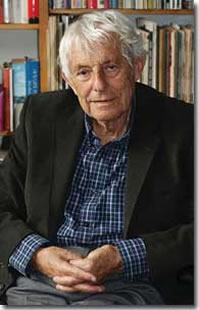
Dannie Abse (Cardiff, 22 september 1923)
De Nederlandse schrijver Lodewijk van Deyssel werd geboren op 22 september 1864 in Amsterdam. Zie ook mijn blog van 22 september 2006 en ook mijn blog van 22 september 2007 en mijn blog van 22 september 2008 en ook mijn blog van 22 september 2009.
Uit: De kleine republiek
“In de koude kerk ging elk naar zijn vaste plaats, op de smalle vaalstoffige knielplankjes […]. Toen alle jongens er waren, begon achter op de bovenkerkvloer, in de felste aflichting der waterklare hoog-vensters, tegen het groote altaar op, de mis van den direkteur, het zwarte achterhoofd boven de witte en goudig-gele miskleêren, staand midden voor de hooge smalle altaartafel, en in eht half uur een enkele maal, geel en wit, naar den rechter hoek gaand en naar den linker hoek, zich enkele malen keerend naar kerk, de handen recht-op open voor de schouders en weêr lang uit in de hoogte samengehouden voor kin en borst, en al het zilverig witte licht uit den hooge afgekaatst op den effen kwart-bol van het helwit weêrschijnende voorhoofd als een zon door een regenlucht. De donkere jongenslijven waren beneden, in diepe verte naar het altaar, dat hoog en breed boven hun samen-donkerte was in zijn alleen geel en wit. Twee jongens in zwarte toogjes dienden de direkteurs-mis, knielend op de bovenste treê van de omrondende altaartrappen. En telkens kwam er uit een muurdeur rechts van het altaar, een jongen, in zijn gewone pakje, de handen voor de borst om een kerkboek heen, en, drie pas achter hem, een professer in miskleêren, blinkend geel en wit, waardig matig aankomend over de lange wit en blauw ruitige steenen vloer, daalden de smalle trapjes af en gingen naar links, naar rechts, voor de gebankten heen, bezijde de gebankten langs, en stil aan de kleine altaartjes in de zijbeuken en achter de zijbeuken, in de open kapellen die de zijbeuken voortzetten rechts en links van de bovenkerk, en elk zijn mis aan ’t doen. Door de hoog-sombere stilte der boven-kerkruimten ging het geprevel en het geschel van de altaartjes op, zware fluisteringen van alle kanten.
(…)
“Zij gingen zitten op de onderste tree, luisterden of er niet iemand kwam, maar de hoge kerkstilte bleef onbewogen achter hen. Dan schoof Willem zich zo, dat zijn rechterdij helemaal de geliefde raakte. Dan pakte hij hem aan, met zijn grove jongenslinksheid, zijn rechterarm langs de grijze rug doend, zijn linkerarm over de linker van de geliefde en over zijn borst, tot zijn handen vreemd elkaar voelden en samenvatten op die rechterschouder. Dan drukte hij zich tegen hem aan en zoende hem op zijn wangen en zijn mond.”
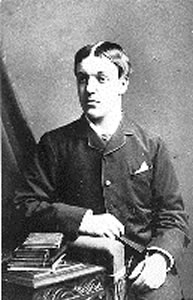
Lodewijk van Deyssel (22 september 1864 – 26 januari 1952)
Een nog jonge van Deyssel
De Britse schrijfster Fay Weldon werd geboren op 22 september 1931 in Alvechurch, Engeland. Zie ook mijn blog van 22 september 2006 en ook mijn blog van 22 september 2007 en mijn blog van 22 september 2008 en ook mijn blog van 22 september 2009.
Uit: The Life and Loves of a She-Devil
„Mary Fisher lives in a High Tower, on the edge of the sea: she writes a great deal about the nature of love. She tells lies.
Mary Fisher is forty-three, and accustomed to love. There has always been a man around to love her, sometimes quite desperately, and she has on occasion returned this love, but never, I think, with desperation. She is a writer of romantic fiction. She tells lies to herself, and to the world.
Mary Fisher has $ (US) 754,300 on deposit in a bank in Cyprus, where the tax laws are lax. This is the equivalent of ý502,867 sterling, 1,931,009 German marks, 1,599,117 Swiss francs, 185,055,050 yen, and so forth, it hardly matters which. A woman’s life is what it is, in any corner of the world. And wherever you go it is the same — to them that hath, such as Mary Fisher, shall be given, and to them that hath not, such as myself, even that which they have shall be taken away.
Mary Fisher earned all her money herself. Her first husband, Jonah, told her that capitalism was immoral, and she believed him, having a gentle and pliable nature. Otherwise no doubt by now Mary Fisher would have a substantial portfolio of investments. As it is, she owns four houses and these are cumulatively worth — depending on the state of the property market — anything between half a million and a million dollars. A house, of course, only means anything in financial terms if there is anyone to buy it, or if you can bear to sell it. Otherwise a house can only be somewhere to live, or somewhere where those connected with you can live. With luck, the ownership of property brings peace of mind; without this luck it brings aggravation and discontent. I wish unluck in property matters on Mary Fisher.
Mary Fisher is small and pretty and delicately formed, prone to fainting and weeping and sleeping with men while pretending that she doesn’t.
Mary Fisher is loved by my husband, who is her accountant.
I love my husband and I hate Mary Fisher.“
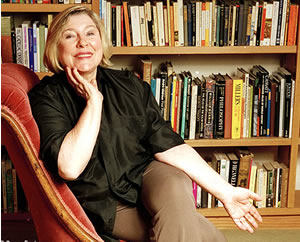
Fay Weldon (Alvechurch, 22 september 1931)
De Hongaarse dichter en schrijver György Faludy werd geboren op 22 september 1910 in Boedapest. Zie ook mijn blog van 22 september 2009.
The Cabbage Moth
My eyes are on the tiny terrace garden
under a forebodingly dark sky.
From the left a white cabbage moth
comes flying in between the high
supporting walls. Most likely this
morning gave him these carefree wings,
but he should know this evening will
see the end of his happy flutterings.
And soon he exits to the right,
his visit to earth a hurried one,
just like ours, his schedule tight.
The clouds are heavy with rain to pour.
Two drops, and the moth will be gone.
Funny, I think. For me, it’ll take no more.
The Seventy-Sixth
Aladdin’s lamps, the stars above
the city have long lost their sheen.
The field has turned into a highway,
and the forest a magazine.
Oil is consumed by marshes,
and oxygen by industry,
the lakes are spawning rotting fish,
sulfur spices up the sea.
But the placid public mood
can’t see the knife not so far off,
our son will starve tomorrow,
for us plenty is not enough.
We’ve conquered nature all right,
but it’s our nature we should rise above.
Vertaald door Paul Sohar
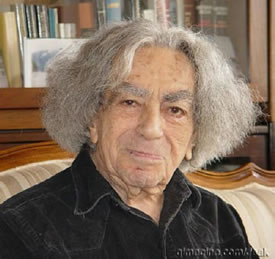
György Faludy (22 september 1910 – 1 september 2006)
De Israëlische Hebreeuwse en Jiddische dichter en politicus Uri Zvi Greenberg werd geboren op 22 september 1896 in Bialikamin, Lviv, in Galicië, destijds behorend tot Oostenrijk-Hongarije. Greenberg stamde uit een beroemde chassidische familie. Van 1915 tot 1917 was hij een soldaat in het Oostenrijks-Hongaarse leger. Toen deserteerde hij. Terug in Lviv (Dt: Lemberg) in 1918 was hij getuige van de pogroms, iets wat hem diep beïnvloed heeft. Hij woonde daarna in Berlijn en Warschau, waar hij begon te schrijven in het Jiddisch en Hebreeuws. In 1924 emigreerde Greenberg naar het Britse mandaatgebied Palestina. Daar werd hij enthousiast over de kibboetsbeweging en schreef hij alleen nog in het Hebreeuws, eerst voor het tijdschrift Davar, een belangrijk orgaan van de zionistische linkse arbeidersbeweging. Na het bloedbad in Hebron in 1929 werd Greenberg steeds militanter. Hij bekritiseerde de passiviteit van de Britse autoriteiten ten aanzien van het geweld in het Palestijnse Mandaatgebied. Hij werd lid van de rechtse Irgun en de ondergrondse organisatie Lehi, een afsplitsing van de Irgun. Sinds 1930 was hij een fervent voorstander van de revisionistische vleugel van het zionisme, en vertegenwoordigde de revisionistische zionistische beweging tijdens verschillende bijeenkomsten in Polen. Bij het uitbreken van de Tweede Wereldoorlog was hij toevallig in Polen, maar hij was in staat om terug naar Palestina te gaan. De rest van zijn familie kwam tijdens de Holocaust om het leven. Na de stichting van Israël in 1948 tradGreenbergtoe tot de Herut Partij van Menachem Begin en in 1949 werd hij in de Knesset gekozen.
A Land Lost
Trusting their folly though their pilot is out
Blind to what’s written on the walls all about
Written by a hand moved by G-d’s ire
Hubris of traitors that to lead aspire.
My people obey them like sheep in human attire
Multitudes drifting to their funeral pyre
Their herders know not, but I know what they do
Pray G-d, a miracle, save, their doom undo
Lord, bare are all rocks and on the heather no dew.
For most are in the pit and the rest at its portal
I know, for I totter with my feet on its edge
dragging myself as the most wretched of prophets
of land lost by the guilt of its leaders.
The Great Sad One
The Almighty has dealt bitterly with me
That I did not believe him until my punishment,
Till he welled up in my tears, from the midst of my wounds.
And behold he is very lonely,
And he also lacks someone to confess to,
In whose arms he might sob his unbearable misery,
And this G-d walks about, without a body, without blood,
And his grief is double the grief of flesh,
Flesh that can warm another body of a third,
That can sit and smoke a cigarette
And drink coffee and wine,
And sleep and dream until the sun —
For him it is impossible for he is G-d.

Uri Zvi Greenberg (22 september 1896 – 8 mei 1981)
De Britse schrijfster Rosamunde Pilcher werd op 22 september 1924 geboren in Lelant, Cornwall, Groot-Brittannië. Zie ook mijn blog van 22 september 2009.
Uit: September
“Death is nothing at all. It does not count. I have only slipped away into the next room. Nothing has happened. Everything remains exactly as it was. I am I, and you are you, and the old life that we lived so fondly together is untouched, unchanged. Whatever we were to each other, that we are still. Call me by my old familiar name. Speak of me in the easy way which you always used. Put no difference into your tone. Wear no forced air of solemnity of sorrow. Laugh as we always laughed at the jokes that we enjoyed together. Play, smile, think of me, pray for me. Let my name be ever the household word that it always was. Let it be spoken without an effort, without the ghost of a shadow upon it. Life means all that it ever meant. It is the same as it ever was. There is absolute and unbroken continuity. What is this death but a negligible accident? Why should I be out of mind because I am out of sight? I am but waiting for you, for an interval, somewhere very near, just around the corner. All is well.”
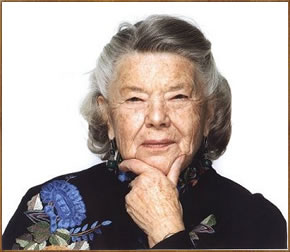
Rosamunde Pilcher (Lelant, 22 september 1924)
De Duitse dichter en schrijver Hans Leip werd geboren op 22 september 1893 in Hamburg. Zie ook mijn blog van 22 september 2008.
Uit: Hamburg, Juli 1943
„So sah mans in Blankenese vom Bismarckstein aus, als die Bomber davonwaren; ich stand und zeichnete dies Blatt, und die brennende Stadt leuchtete über viele Kilometer hin genug, so daß ichs hinkriegen konnte mit dem schwarzen Kreidestift. Es war der dritte große Angriff gewesen. Den Nachmittag war ich vom Bodensee nach Hause gelangt. Am anderen Morgen fuhr ich mit Baurat Müller in die Stadt (dem Vater Gesas, der Freundin meiner ältesten Tochter Mule). An manchen Stellen brannte es noch. Ich sah einen verstörten Mann im Schlafanzug umherirren, einen Band Gedichte in der Hand. Er beschäftigte meine Phantasie so sehr, daß ich ihn Herr Pambel nannte und sein Schicksal beschrieb.“
„Hab und Gut häufte sich auf den Straßen, als sollte eine Auktion in freier Luft stattfinden. Der große deutsche Ausverkauf hatte begonnen. In mir sagten sich die ersten Zeilen des „Liedes im Schutt“ her. Ich zeichnete dabei, was ich sah, obwohl es verboten war …“
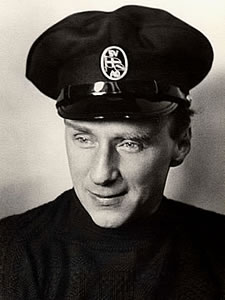
Hans Leip (22 september 1893 – 6 juni 1983)
Leip in 1936
De Duitse dichter Barthold Heinrich Brockes werd geboren in Hamburg op 22 september 1680. Brockes studeerde rechtsgeleerdheid in Halle en maakte reizen naar Italië, Frankrijk en Nederland. Hij vestigde zich vanaf 1704 in Hamburg. In 1720 werd hij benoemd als lid van de Hamburgse gemeenteraad, en bekleedde diverse functies in het bestuur van de stad. Hij was 6 jaar (van 1735 tot 1741) magistraat in Ritzebüttel. Gedichten van Brockes werden in 9 banden gepubliceerd onder de titel Irdisches Vergnügen in Gott (1721-1748). Hij vertaalde Giambattista Marini’s La Strage degli innocenti (1715), Alexander Pope’s Essay on Man (1740) en James Thomson’s Seasons (1745). Het libretto Der für die Sünden der Welt gemarterte und sterbende Jesus (1712) was één der eerste passie-oratoria, een vrije en poëtische meditatie op het passieverhaal zonder gebruik van een evangelisch karakter. Het was een populair werk, en werd op muziek gezet door onder andere Reinhard Keiser, Georg Philipp Telemann, Georg Friedrich Händel enJohann Mattheson.
Falschheit
Es herrschet in der Welt die Falschheit aller Orten;
die Wahrheit ist verbannt, die Redlichkeit verjagt;
die Freunde dieser Zeit sind Freunde bloß in Worten:
der Allerehrlichste tut anders, als er sagt.
Der, so dich herzt und küsst, wird dich ohnfehlbar fällen,
So bald er glaubt, dein Fall könn’ ihm erspriesslich sein.
Kein Mensch ist, was er scheint: man weiss sich zu verstellen,
Nie stimmt mit dem Gemüt das Ansehn überein.
Doch dieses alles muß man nicht von Weibern meinen,
Weil ihrer keine fasst uns je betrogen hat,
Indem sie insgemein von aussen boshaft scheinen:
Und wenn man’s untersucht, so sind sie’s in der Tat.
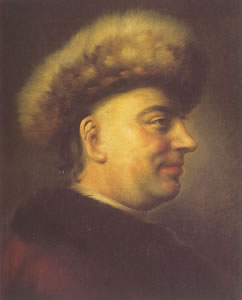
Barthold Heinrich Brockes (22 september 1680 – 16 januari 1747)
Portret door Dominicus van der Smissen
